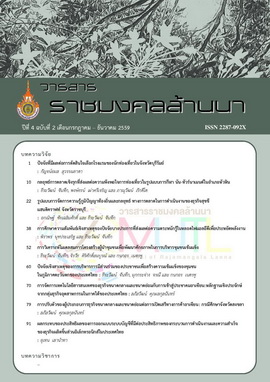The Important of Non-verbal Communication toward Hiring Decision the Case Study of Companies in Amata Nakorn Industrial Estate, Thailand
Main Article Content
Abstract
บทคัดย่อ
การสื่อสารเชิงอวัจนภาษามีความสาคัญอย่างมากสาหรับการสื่อสาร ซึ่งจากงานวิจัย ได้แสดงว่า 55% ของการสื่อสารทั่วไป ขึ้นอยู่กับ การสื่อสารเชิงอวัจนภาษา ซึ่งความสาคัญของการสื่อสารเชิงอวัจนภาษาอาจจะมีความเหมือน หรือ แตกต่างขึ้นอยู่กับ บริบทของการสื่อสาร และ วัฒนธรรม ของผู้สื่อสาร งานวิจัยนี้ได้มุ่งศึกษายังการสื่อสารเชิงอวัจนภาษาที่มีผลต่อการตัดสินใจเลือกพนักงานของบริษัทใจอมตะนครในประเทศไทย ผลการวิจัยพบว่า การสื่อสารเชิงอวัจนภาษามีความสาคัญต่อการเลือกพนักงาน และ ยิ่งไปกว่านั้น ในวัฒนธรรมไทย ยังให้ความสาคัญการ “กาลเทศะ” จากการวิจัย พบว่า การมีกาลเทศะที่มีบทบาทค่อนข้างมากต่อการมีผลต่อการได้รับเลือกเป็นพนักงานของบริษัท ประกอบไปด้วย การตรงต่อเวลา, การแต่งกายที่สุภาพ, การมีสัมมาคารวะ และ การเลือกใช้คาพูด
Abstract
Literatures shows that more than 55% of all communication, relying on non-verbal communication. The significance of non-verbal communication may vary based on situation and culture of sender and receiver. For the purpose of this study, the researchers have focused on hiring decision of Thai employers at Amatanakorn. The finding showed that non-verbal communication plays a significant role in hiring decision, in addition, in Thai culture “Kalatesa” or harmony of time and manner, or disciplinary is the common use for hiring consideration. Kalatesa may have a broaden term in Thai. For hiring decision this study found that most of Thai interviewers are focused more on punctuality, dress, manner, and speech of interviewees. The candidates who understand the important of Kalatesa especially punctuality, dress, manner, and speech may result in a higher chance of be employed.
Article Details
บทความวิจัยนี้เป็นของลิขสิทธิ์

